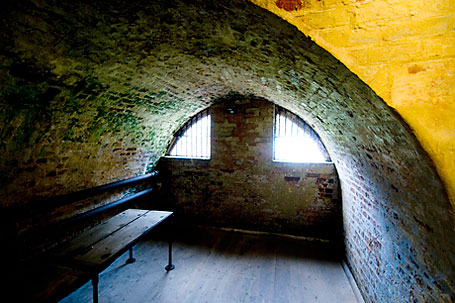|
|
CONSCIENTIOUS OBJECTION The STORY OF THE HARWICH 'FRENCHMEN' One of the Harwich 'Frenchmen' was Harry Stanton, the son of a Luton blacksmith. He had felt isolated because of his anti-war views - but 'the very isolation gave me a strange sense of joy - perhaps an expression of my combatant instinct! Now and again, as I met men and women whose convictions were leading them along the same unpopular course, came the feeling that here was something worth doing, that we must somehow hang on to this foundation of truth and sanity we had discovered.' On his 21st birthday he founded the Luton branch of the NCF. 'For an individual to attempt to resist the power of the state would be a tremendous venture.' Alfred Evans, an apprentice piano tuner, was another Harwich detainee. He was the son of a committed trade union man - and connection with a trade union was a risky thing in those days. He was at first willing to join the RAMC, and was granted a non-combatant certificate on that basis. When he reported to his local recruiting office, 'the lieutenant asked for my certificate and promptly tore it up: I was going to be put in the NCC, he said. I flatly refused, and he called the guard - two men and a corporal with fixed bayonets - and I was taken to Hounslow Barracks.' Before sailing Harry and Alfred were put in the punishment cells at Harwich: 'completely dark, dripping with water and overrun with rats, for three days without food'. 'It was impossible to sleep.' 'Our guards kept telling us we'd soon be pushing up the daisies, so we weren't surprised to hear we were going to France - in irons. We were asked to make our wills, but all 17 of us refused.' From Le Havre the 17 were taken to a huge parade ground at what the army called 'Cinder City' and distributed among the thousand or so soldiers lined up there. Military drill began, but 'not one of us moved. It must have been an amazing sight to see this small group of us scattered motionless over the huge parade ground.' After that all kinds of tactics were unsuccessfully employed in the attempt to bully or frighten the 17 into obeying orders. Some of the regular soldiers began to observe their visitors with respect. (One sent his dinner to Alfred Evans, 'with my compliments'.) Several of the men, including Harry Stanton, were moved to a field punishment camp at Harfleur for 28 days. At first they were daily tied by the arms to a kind of crucifix; later on they were roped, face-forward, to a barbed wire fence. Yet Harry didn't feel they had special grounds for complaint. Recounting in detail but without drama the vicious physical treatment he endured, Harry said: 'We were exceptional cases, and militarism was making an effort to break down our resistance.' What bothered him most was that the same kind of punishment might be inflicted also on men who had willingly volunteered for the army, should they cross the professionals. Moved to Boulogne, the 17 were handcuffed with their hands behind their backs in a timber cage roughly 12 feet square, with one toilet bucket between them. After protests such extreme treatment was stopped, but conditions still weren't good. After a month Alfred went down with dysentery. Too weak to move, he couldn't go to the aid of a wounded man whom a medical orderly had let fall. The orderly hauled his patient up, pointed at Alfred and said, 'There's the bloody man who wouldn't help a wounded soldier'. All 50 'Frenchmen' were brought together at Henriville military camp in June for court-martialling. Just before the trials, a captain told Alfred that his papers were marked 'Death': was he going to continue to resist? Alfred said, 'Yes. Men are dying in agony in the trenches for the things that they believe in and I wouldn't be less than them.' To Alfred's astonishment, 'he stepped back and saluted me, then shook my hand.' The sentences were read out in public, in front of thousands of soldiers in formation. 30, including Alfred and Harry, were sentenced to death, commuted in each case (after a dramatic pause in the reading) to penal servitude for 10 years. They were shipped back to Britain, this time to civilian imprisonment. Harry and Alfred agreed to be assigned to manual labour under the Home Office Scheme. Harry was sent to Dyce Work Camp near Aberdeen. Two hundred men were placed there to work at quarrying stone, and they endured harsh conditions, leaky tents, little sanitation, not much to eat, and no treatment for illness. A young CO called Walter Roberts died, and after that the camp was closed. At his next placement Harry soon suspected that COs were being given jobs to liberate new conscripts to die on the battlefields. He refused to work, and went back to prison until 1919. __Alfred Evans was sent to a waterworks in South Wales. 'It was a slave-driving job and they put professional slave drivers over us.' Alfred soon found out that the managers were creaming off much of the government's labour grant into their own pockets. He called 'our boys' together; the COs went on strike and were promptly sent back to prison. After 1919 Alfred had difficulty getting work. 'I was drummed out of London.' Out of London, however, he had better luck than most of his fellow COs: 'There was a shortage of piano tuners, you see. It was purely economic: they wanted a tuner and so I got a job.' | continue |



